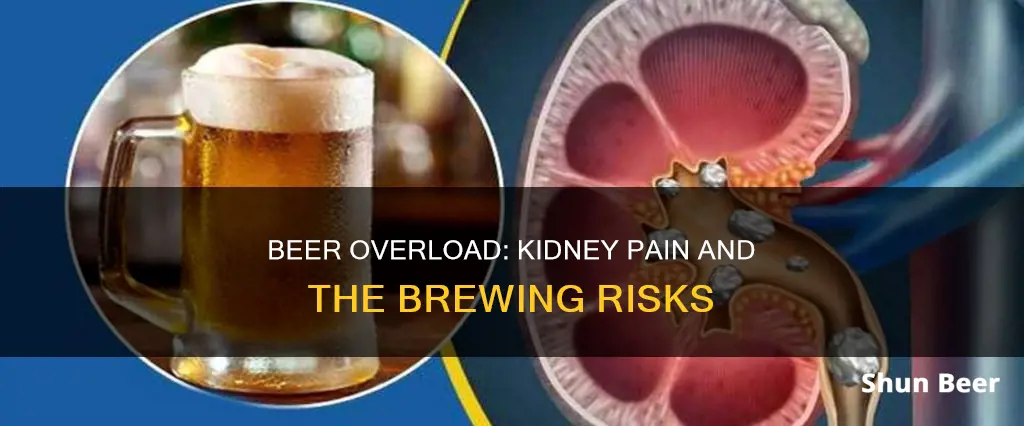
Drinking too much beer can cause kidney pain. Beer is a diuretic, which means that it increases urine production and can lead to dehydration. Dehydration can interfere with kidney function and cause pain in the areas surrounding the kidneys, such as the back, abdomen, and under the rib cage. Additionally, heavy drinking can affect kidney function by causing a sudden drop in kidney function, known as acute kidney injury, and can lead to long-term kidney damage. Alcohol consumption can also cause liver disease, which adds to the workload of the kidneys and impairs their ability to filter blood effectively. Regular heavy drinking is considered more than three drinks per day for women and more than four drinks per day for men, and it can double the risk of developing chronic kidney disease. Therefore, it is important to drink in moderation and limit alcohol intake to protect kidney health.
What You'll Learn

Dehydration
Causes of Dehydration
Symptoms of Dehydration
The symptoms of dehydration can vary depending on its severity. Some common signs and symptoms of dehydration include:
- Thirst: Feeling thirsty is an early indicator of dehydration.
- Dry mouth, skin, and eyes: Dehydration can cause a decrease in saliva production, leading to a dry mouth and throat. The skin may also feel dry and appear flaky or wrinkled.
- Fatigue and dizziness: Dehydration can affect blood volume and blood pressure, leading to fatigue, dizziness, and lightheadedness.
- Dark-coloured urine: The colour and odour of urine can be indicative of hydration status. Dark-coloured urine often indicates dehydration, while pale or clear urine suggests adequate hydration.
- Headache: Dehydration can trigger headaches or make existing ones worse.
- Muscle cramps: Dehydration can affect muscle function and lead to cramps or muscle spasms.
Impact of Dehydration on the Kidneys
Preventing and Treating Dehydration
To prevent dehydration when drinking beer, it is essential to stay hydrated by drinking plenty of water alongside alcoholic beverages. Alternating alcoholic drinks with water can help maintain hydration levels. Additionally, consuming drinks that contain electrolytes, such as sports drinks or coconut water, can help replace lost fluids and minerals. Eating water-rich foods, such as fruits and vegetables, can also contribute to hydration.
If dehydration occurs, it is important to rehydrate by drinking plenty of fluids and seeking medical attention if symptoms are severe or persist. Mild dehydration can usually be managed by increasing fluid intake and resting. However, more severe cases may require medical intervention, such as intravenous (IV) fluid administration, especially if kidney function is impaired.
Valerian Tea and Beer: A Safe Mix?
You may want to see also

Acute kidney injury
The kidneys are responsible for filtering out harmful substances from the blood, including alcohol. When a person binge drinks, waste can accumulate in the blood at a faster rate than the kidneys can filter it out. This can result in high levels of toxins leading to tissue injury and inflammation in the kidneys.
Symptoms of Acute Kidney Injury
In addition to kidney pain, a person with AKI may experience:
- Swollen legs, ankles, or face
- Difficulty breathing or shortness of breath
- Chest pressure or pain
- Seizures
- Coma
Without treatment, acute kidney injury can lead to lasting kidney damage. However, in most cases, kidney function returns to normal over time, and the injury is not permanent.
Treatment for Acute Kidney Injury
Treatment options for acute kidney injury may include:
- Short-term dialysis to remove accumulated toxins from the blood
- Electrolytes or intravenous fluids to manage dehydration
- Medication to lower blood pressure and treat other symptoms
- Dietary and lifestyle changes to support kidney function
Prevention of Acute Kidney Injury
To prevent acute kidney injury, it is important to:
- Reduce alcohol intake or avoid binge drinking
- Drink plenty of water if consuming alcohol
- Adopt a healthy, balanced diet
- Exercise regularly
- Maintain a healthy body weight
- Treat any other medical conditions, such as diabetes
Invisalign and Beer: Is It Safe?
You may want to see also

Urinary tract infection
Alcohol does not directly cause UTIs, but it can raise your risk of getting one and worsen your symptoms. Alcohol can irritate your bladder, making UTI symptoms seem worse. It can also impair your immune system, which might raise your risk of a UTI. Alcohol increases the acidity of urine, and can irritate the lining of the bladder. A person who drinks alcohol can become dehydrated, increasing the risk of a UTI.
UTIs can present with a variety of symptoms, which can range from mild to severe. Some of the most common symptoms of UTIs include:
- A frequent and urgent need to urinate
- A burning sensation or pain during urination
- Cloudy or strong-smelling urine
- A feeling of incomplete bladder emptying
- Pelvic pain or discomfort
- Blood in the urine (hematuria)
If you are experiencing any of these symptoms, it is important to consult a healthcare professional for a proper diagnosis and treatment.
Santa's Favorite Beverage: Beer or Not?
You may want to see also

Liver disease
Excessive alcohol consumption can lead to a condition known as Alcohol-Related Liver Disease (ARLD), which is characterised by liver damage caused by drinking too much alcohol. ARLD has several stages of severity and associated symptoms. However, it usually doesn't cause noticeable symptoms until the liver has been severely damaged.
- Alcoholic Fatty Liver Disease: Even a few days of heavy drinking can lead to a build-up of fats in the liver, known as alcoholic fatty liver disease. This stage rarely causes symptoms but serves as a warning sign that you're drinking at a harmful level. The good news is that this condition is reversible. If you stop drinking alcohol for a few weeks to a few months, your liver should return to normal.
- Alcoholic Hepatitis: Alcoholic hepatitis is a potentially serious condition that typically develops after prolonged alcohol misuse over a longer period. It can, however, also occur as a result of binge drinking. Alcoholic hepatitis is an acute inflammation of the liver, leading to liver cell death and permanent scarring. The liver damage associated with mild alcoholic hepatitis is usually reversible if you stop drinking permanently. However, severe alcoholic hepatitis is life-threatening and claims many lives each year.
- Cirrhosis: This is the most advanced stage of ARLD, where the liver has become significantly scarred. Even at this stage, there may not be any obvious symptoms. Cirrhosis is generally not reversible, but stopping drinking alcohol immediately can prevent further damage and significantly increase your life expectancy. A person with alcohol-related cirrhosis who continues drinking has a less than 50% chance of living for at least five more years.
The treatment for ARLD primarily involves stopping drinking alcohol, also known as abstinence. For fatty liver disease, abstinence from alcohol for at least two weeks is recommended, after which it is usually safe to resume drinking within recommended limits. However, for more severe forms of ARLD, such as alcoholic hepatitis or cirrhosis, lifelong abstinence is advised to prevent further liver damage and potential liver failure.
In addition to abstinence, support, advice, and medical treatment may be necessary to manage alcohol dependence. Psychological therapy, self-help groups, and medication can also play a role in the treatment process.
It's important to note that ARLD is a preventable condition. The most effective way to prevent it is to avoid drinking alcohol or stick to the recommended limits. Even if you've been a heavy drinker, reducing or stopping alcohol consumption will have significant short-term and long-term benefits for your liver and overall health.
Beer and Tums: Safe Mix or Not?
You may want to see also

High blood pressure
Drinking too much beer can lead to high blood pressure, also known as hypertension. This is because excessive alcohol consumption can cause the muscles in your blood vessels to narrow. Consequently, the heart has to work harder to pump blood around the body, resulting in an increase in blood pressure. The more alcohol you consume, the higher the risk of hypertension. Even one drink per day can increase the likelihood of developing high blood pressure.
In addition to high blood pressure, excessive alcohol consumption can also lead to other cardiovascular issues such as an increased risk of strokes, cardiomyopathy (stretching and drooping of the heart muscle), and arrhythmias (irregular heartbeat). Therefore, it is important to monitor your alcohol intake and seek professional help if you are finding it challenging to cut back.
Drinking Beer While Driving in Australia: What's the Law?
You may want to see also







